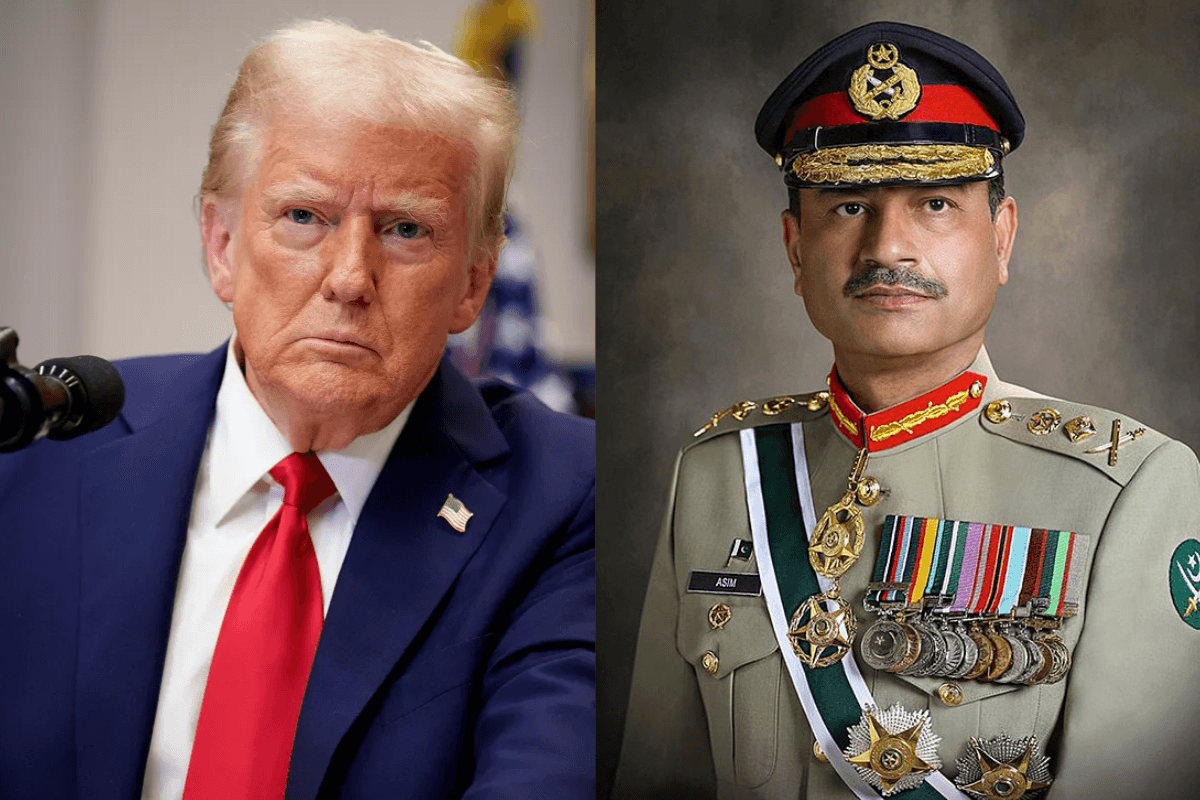Trump says he thanked Pakistan army chief for avoiding war
US president confirms Iran was discussed, says Pakistan knows Iran very well
News Desk
The News Desk provides timely and factual coverage of national and international events, with an emphasis on accuracy and clarity.

U.S. President Donald Trump on Wednesday said he met with Pakistan’s army chief, Field Marshal Syed Asim Munir, to personally thank him for helping prevent a full-scale war with India.
Speaking to reporters after meeting the army chief for a White House lunch, Trump called Munir and Indian Prime Minister Narendra Modi, both, “two very smart people.”
“The reason I had him here was that I wanted to thank him for not going into the war. And I want to thank PM Modi as well, who just left few days ago. We're working on a trade deal with India and Pakistan.
“These two very smart people decided not to keep going with war that could have been a nuclear war. Pakistan and India are two big nuclear powers. So I was honored to meet him (FM Asim Munir) today,” Trump said.
Iran also made it to the agenda of their talks, Trump said answering a question.
“Well, they know Iran very well, better than most, and they're not happy about anything. It's not that they're bad with Israel. They know them both, actually, but they know Iran better. He (FM Asim Munir) agreed with me.”
In a separate statement issued Thursday, the Pakistan army said, "President Trump expressed keen interest in forging a mutually beneficial trade partnership with Pakistan based on long-term strategic convergence and shared interests."
The meeting initially scheduled for one hour, extended for over two hours, "underscoring the depth and cordiality of the dialogue," the statement further said.
Trump was accompanied by Secretary of State Senator Marco Rubio and Mideast envoy Steve Witkoff. Munir was joined in by Pakistan’s National Security Advisor Lt. Gen. Asim Malik, the statement said.
Diplomatic win?
The remarks came after a private lunch hosted by Trump for Munir at the White House — a closed-door meeting held in the Cabinet Room and not open to the press. The lunch was included in the official presidential schedule, and is being viewed in Islamabad as a major diplomatic moment for Pakistan.
Munir, who became Pakistan’s first five-star general since 1959, concluded a five-day official visit to the United States. His White House visit follows last month’s India-Pakistan air confrontation, which brought the two nuclear-armed neighbors to the edge of open conflict.
Michael Kugelman, South Asia analyst at the Wilson Center, described the meeting as “significant, especially as his administration considers its options during the war in Iran.” In a post on X, he noted that while U.S. officials often engage with Pakistani army chiefs, “rarely is one hosted at the White House by the U.S. President.”
He added, “The scheduled Trump-Munir meet shouldn’t only be seen through the lens of the Israel-Iran war. There’s been US-Pak engagement on critical minerals, crypto, CT. Trump takes a deep personal interest in all of these. And Munir is empowered to talk about it all. Also, Kashmir.”
"With the Trump-Munir lunch meeting about to happen, safe to say we’ve come a long way from the 'you’ve given us nothing but lies and deceit' tweet," Kugelman added.
Ex-FM Bilawal calls meeting 'positive'
Pakistan's Former Foreign Minister Bilawal Bhutto-Zardari welcomed the meeting as a “positive step for bilateral relations.”
“Following Pakistan’s decisive victory in the recent five-day war, India has regrettably resisted all efforts toward a permanent peace, including US-led diplomacy,” Bilawal said on X. “There is no military solution to our disputes. India’s weaponisation of water, repression in Kashmir, and politicisation of terrorism are unsustainable positions. The path forward lies in honest diplomacy — not denial.”
Bilawal is leading a high-profile Pakistani delegation to garner international support for Pakistan after a four-day war with India. He has so far visited the U.S., U.K. and Brussels.
'Phenomenal partner'
Perhaps the most consequential outcome of Munir’s visit has been the deepening counterterrorism cooperation between the U.S. and Pakistan. Gen. Michael Kurilla, commander of U.S. Central Command, praised Pakistan as a “phenomenal partner” in the fight against Islamic State Khorasan (IS-K).
Kurilla told the House Armed Services Committee last week that Pakistani operations — with U.S. intelligence support — had led to the killing of dozens of IS-K militants and the capture of high-value operatives, including Mohammad Sharifullah, a planner of the 2021 Abbey Gate bombing in Kabul.
“The first person Munir called was me,” Gen. Kurilla testified. “He said, ‘I’ve caught him — ready to extradite him back to the US. Please tell the secretary of defence and the president.’” Sharifullah was promptly extradited.
Munir’s U.S. visit marks a turning point in Pakistan’s regional diplomacy and security cooperation with Washington at a time of major geopolitical flux — from Iran’s war with Israel to persistent instability in Afghanistan and growing India-Pakistan friction.







Comments
See what people are discussing